An Unscheduled Stop: a short story inspired by Orford Ness
On a bright, cold day in January 2025, I went to Orford Ness as part of the Beach of Dreams project, with the aim of finding creative inspiration in its sights and stories. As well as having a really interesting day out, I got a short hopepunk sci-fi out of it.
A key aim of the overall project was to produce and display hundreds of silk pennants inspired by parts of Britain’s coastline. In May 2025, I went back to Orford Ness to see the three pennants that artists had produced based on three extracts from my story. As well as a few of my photos, I’ve included links at the relevant points in the story so you can see the pennants – the last of which also includes audio of me reading the extract aloud!
It’s always time for tea on this ship, so when something broke inside the machine, we knew we’d have to pause our journey.
As a location for a pit stop, Earth was a mixed blessing. Positives: it was bound to have scrap material we (or rather, Cam) could use to bodge a repair, and there was nobody there to stop us taking it. Negatives: we had to go a bit out of our way to avoid the burnt side, and hope we didn’t get caught in one of the infamous dust storms (just two reasons humans had long since left the planet and settled elsewhere throughout the galaxy).
It only added to my trepidation that, according to the Galaxy Positioning System, we were in the middle of a sea, yet the sensors on the bottom of the ship, as well as the gentle dry crunch we made when we touched down, suggested otherwise.
‘They probably just haven’t re-scanned Earth in a while,’ Cam tried to reassure me. ‘It’s hardly a popular destination, and its land and sea are always in flux.’ Another reason our ancestors had moved on.
We were en route to Mars, for the Tharsis City Fringe Festival – the premier annual performing arts showcase in the galaxy, and the place to make contacts that could launch your career. Ever since we’d bonded in Freshers’ Week, Cam and I had planned to “do” the season after we graduated. As we came from the next-solar-system-but-one – a tiny one-spaceport planet called Oto – we’d had to scrimp and save, and we were now nearing the end of a weekslong journey.
I’d arranged a daunting number of casual front-of-house shifts around a schedule of script surgeries and pitching slots, while Cam was hoping the lighting tech work she’d secured would lead to further opportunities in the same vein, and of course we wanted to see as many shows as possible on top of that. We’d return to the ship each night to sleep.
We were unlikely friends: Cam was tall and solidly-built, whereas I was short and elfin; she was practical and never lost her head, whereas I was profoundly un-handy and anxiety-prone. Our cohorts had been known to joke that we’d have made a good comedy double-act. I sometimes felt bad that Cam had done most of the work of getting us here in one piece.
‘Are you sure you need me to come out with you?’ I asked as she passed me my adaptive exosuit. ‘I’m not going to be of much use down there.’
‘Hera, you might not be able to help me find the right part, but I want you with me,’ she said. ‘How many people get to say they’ve walked on Earth? This is an experience I want to share with you. And anyway, didn’t you take a couple of electives on Earth culture? You can be my tour guide.’
‘It was only a couple of broad survey courses,’ I pointed out. ‘I’d hardly call myself an expert.’
‘So make an educated guess,’ she grinned, pulling on her own suit.
After all that time in transit, I’d have struggled to adjust to any terrain, but the patch of Earth we’d alighted on was something else. The landscape was the flattest I’d ever encountered, and the scattered remnants of abandoned buildings were all that kept me from freaking out that I could see so far into the distance no matter which way I faced. It was also deathly quiet, without even the ducks and chickens that pecked around every human settlement in the galaxy.
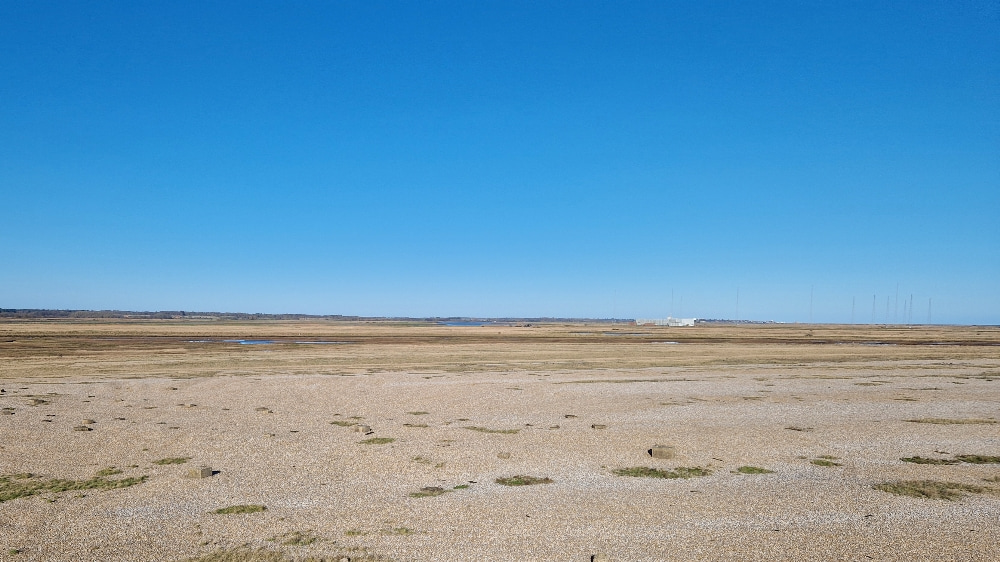
The sky was orange, but it didn’t look the same in every direction. A solid wall of terracotta had greeted me as I emerged through the hatch and descended the fold-out steel steps. On the ground, I turned 120 degrees to see a frothy white line resting on the horizon, creating an ombré effect. Another small turn, and a huge, blazing sun bleached the sky an apricot shade. Even with my suit’s inbuilt temperature regulation system and automatic transition visor, being in its direct path was barely tolerable. At least the filters were effective – I didn’t want to know what toxins were lurking in the air.
‘I always imagined the sky would be blue, like in the old films,’ said Cam. ‘I suppose that’s just how it was Before, though.’
The fields of shingle, scrubby grass, and shallow craters of stagnant water – either from the mercurial sea, or one of Earth’s periodic but violent downpours – that surrounded us were divided by what must have once been a well-delineated stone path, now barely distinguishable by the rotten stumps of wood that lined it on either side. Putting our trust in the wisdom of our forebears, we decided to follow the path with the sun behind us, and walked in silence for a while, stones skittering in our wake. Piles of rubble and corroded scrap metal, as well as the distant buildings growing closer, broke up the monotony of the landscape, and Cam would occasionally veer off course to check out the odd piece of metal that still glinted. She collected a few bits she thought might fit the bill, which I duly zipped into her backpack.
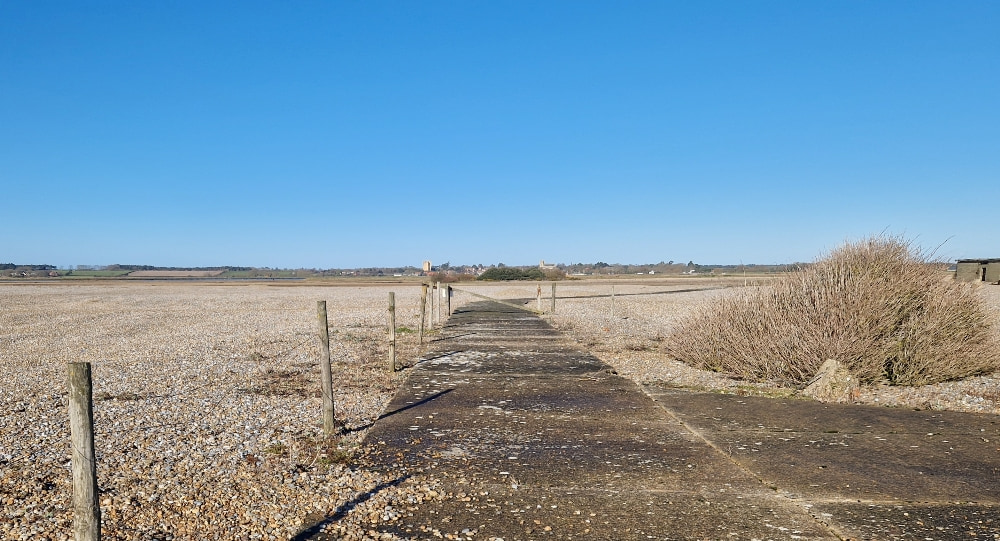
‘One of these will probably be fine if I cut them down a bit, but the perfect piece could be just round the corner,’ she explained. ‘And anyway, I’m curious. I just can’t figure out what this place could have been used for. Like, are those standing stones?’ She pointed at a gathering of squat concrete blocks, positioned to form a semi-circle. ‘I expect you know more about them than I do.’
‘Not really,’ I countered, digging deep to remember what I’d learned on my Human Culture 101 module. ‘Nobody really knew what they were used for Before, even, but they might have been made as tributes to the gods, or sacred spaces for rituals where people asked for good weather and harvests, things like that. Some historians have even suggested they were primitive attempts at building portals.’
‘And what do you think?’ Cam probed.
‘I think they’re a lot smaller than I imagined, though they could have eroded or sunk into the ground, I suppose. Some of the buildings around here give me a bit of a factory vibe,’ I gestured towards a single-storey brick building up ahead. ‘So maybe this was a place food was produced, and the stone circle was used to pray for a continuous supply.’
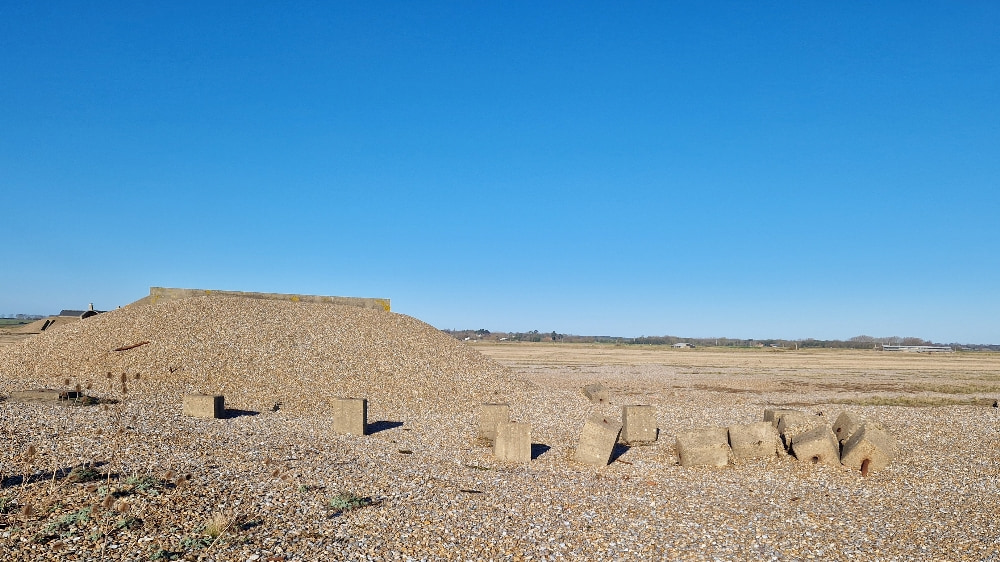
Centuries of dust storms had rendered the building dirty brown, and the window and door frames to the front were empty. I poked my head inside and saw rusted machinery built into the walls and floor, which supported my theory, though I couldn’t even guess what it might have been used for. Cam, meanwhile, trudged around the outside of the building, then called to me.
‘Hera, there’s a massive pile of good metal here. It’s going to take me a bit of time to comb through it, though.’
‘That’s fine, I could use a bit of a rest.’ As I’d only used them on the ship’s cross-trainer these past few weeks, my legs were starting to complain.
I found a chunk of concrete to perch on – this one unceremoniously dumped amid a conglomeration of other rocky waste, rather than deliberately arranged – and pondered the view. I could see a building that bore a resemblance to the Japanese pagodas we’d learned about, except it only had one storey and, like almost everything else here, was constructed from concrete. And while the standing stones had been surprisingly small, even from a distance I could tell this structure was much larger than I’d anticipated. The proportions of this place were making me feel like Alice in Wonderland, and I briefly wondered if my suit was letting in some kind of mind-altering particle.
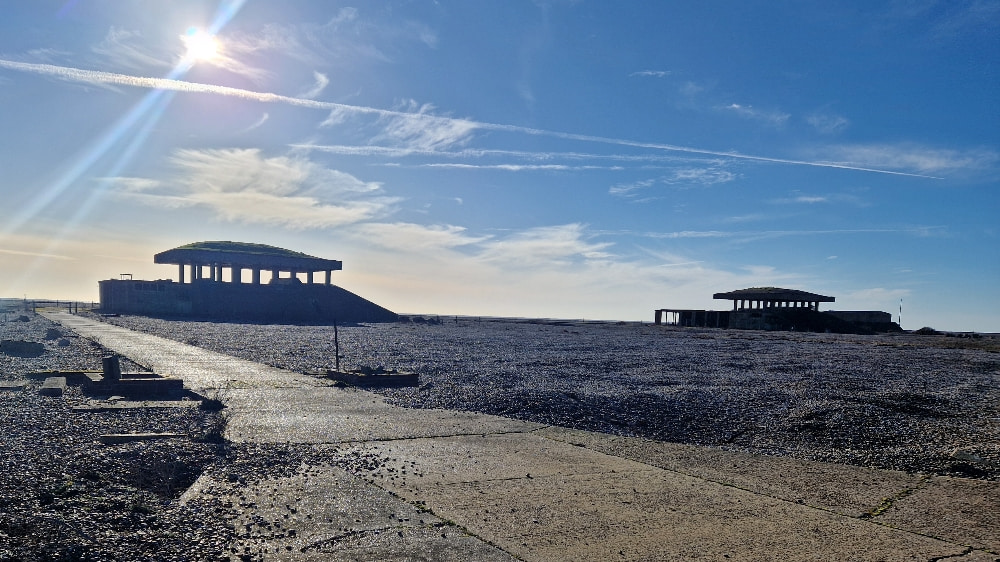
Cam finally emerged with both hands full of shiny metal for me to cram into her backpack. ‘Do you really need all this?’ I complained as I struggled to get the last couple of pieces in.
‘Better to have too much than too little,’ she shrugged, nearly undoing all my hard work. ‘And maybe we can sell some of it if we get really short on- ow!’
A sudden gust of wind had pelted a scattering of shingle at her legs, hard enough to make her yelp despite the suit. While I’d been playing scrap metal Tetris, the sky had turned an ominous grey.
‘I think there’s a dust storm coming!’ she shouted over the wind, which was now whipping up and sending even more debris flying all over. ‘We need to take cover!’
She grabbed me by the sleeve and pulled me round the back of the building where she’d hit the metal jackpot. As the lack of rust on her payload indicated, it was relatively sheltered. We hunkered against the wall and clung to one another as great swathes of dust – ash from the long-ago fires – swirled away from us and reduced our visibility to practically zero. If I’d been on my own, I’d have been terrified out of my wits, but Cam’s solid, calm presence assured me that this would pass, and we would be okay, even though we couldn’t hear one another’s voices over the now howling wind.
And sure enough, after what felt like an age, the wind dwindled to a low moan, then ceased completely, and we were able to see the landscape – now bruised where the dust had met resistance and settled – again. Cam gave my hand a squeeze, and we edged around the building, back to the path.
Despite our caution, what we saw on the path pulled us up short. A long, lithe brown mammal sat on its haunches and shook itself all over – from the unbelievably long ears that stood proud on the top of its head to the stubby, slightly fluffy tail that protruded from its rear – to dislodge the dust from its fur.
‘A hare!’ I whispered to Cam, excitedly.
Careful not to make a sound, we watched the hare twitch and preen until it bolted away. We then walked back to the ship in companionable silence as we processed the enormity of witnessing life – and a stunning representation of life, at that – on Earth.
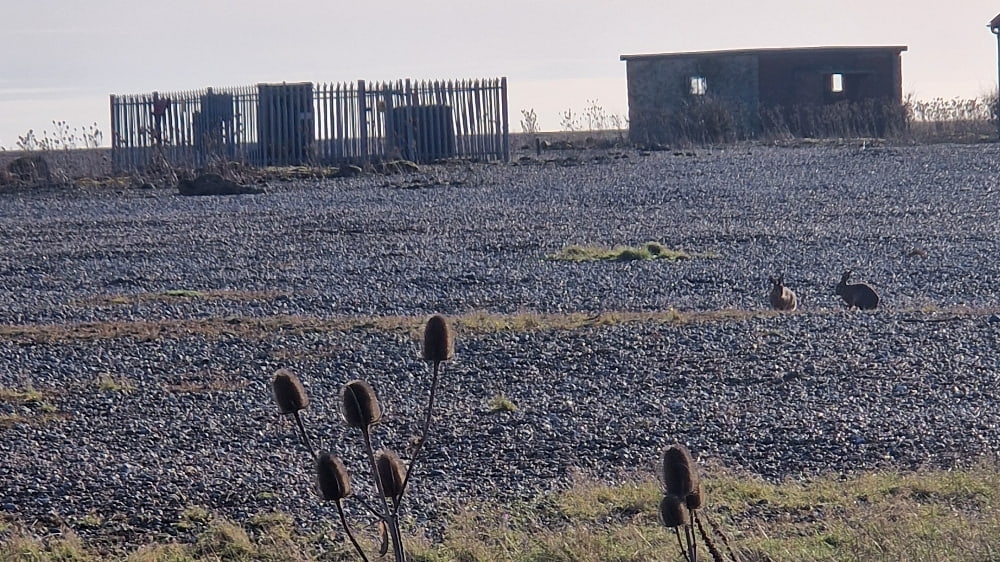
We’re now just half a day from Mars, and I’m enjoying a lovely cup of tea. Since we resumed our journey, we’ve decided not to tell anyone about our stop-off. We’re not sure anyone would believe us anyway, and even if they did, we wouldn’t want them causing further damage to that already depleted planet by going hare-spotting themselves.
Something else we’ll keep between us is the presence of a stowaway, which we think must have scuttled aboard while the hatch was open. Cam found it fast asleep when she went to fix the tea machine. I’m far from an expert on the old species of Earth, but going by the pictures I’ve seen, I’d hazard a guess that our new shipmate is a dormouse.